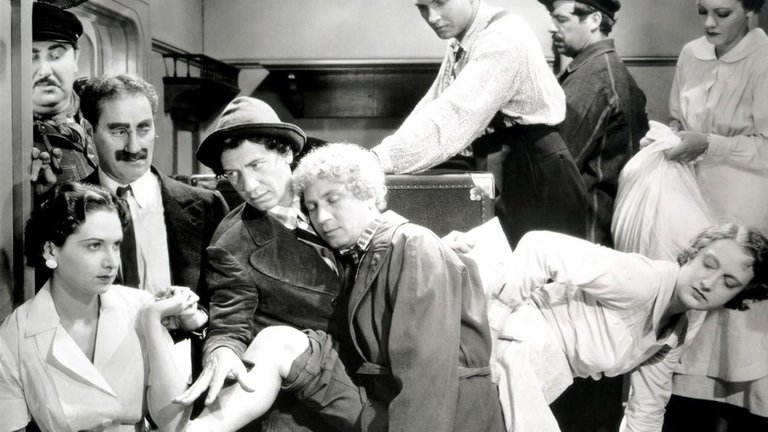Film Review: A Night at the Opera (1935)

One of the most common tropes in histories of cinema are producers and studio moguls who don’t understand True Art and whose controlling ways suffocate extraordinary talents making their films worse and deprive future generations of masterpieces. This, at least according to some critics and film historians, happened with Marx Brother in mid 1930s, when they ended their contract with the more laid back Paramount Pictures and started working for tightly controlled Metro Goldwyn Meyer. This impression persists despite A Night at the Opera, 1935 comedy directed by Sam Wood, being Marx Brothers’ commercially most successful and arguably the most popular film.
The plot begins in Italy where business manager Otis B. Driftwood (played by Groucho Marx) lives off Mrs. Claypool (played by Margaret Dumont), wealthy widow whom he promised to bring to high New York society. In order to do so, Driftwood gets in touch with Herman Gottlieb (played by Sig Ruman), director of New York Opera Company, and arranges scheme according which Mrs. Claypool would invest 200,000 US$ into next production. At the opera house young chorister Riccardo Baroni (played by Allan Jones) hires Fiorello (played by Chico Marx) to become his agent, while Fiorello’s brother Tomasso (played by Harpo Marx), a dresser, gets fired by famous and arrogant tenor Rodolfo Lasspari (played by Walter Woolf King). Riccardo is in love with soprano singer Rosa Castaldi (played by Kitty Carlisle), who is coveted by Lasspari. Driftwood, mistaking Fiorello’s client for Lasspari, signs Riccardo for the production. This would create all kinds of misunderstandings which escalate when Driftwood, Claypool, Gottlieb and his company sail to New York, while Fiorello, Tomasso and Riccardo hide as stowaways.
While all Marx Brothers’ films are an acquired taste, A Night at the Opera and those that followed are more accessible to modern audience than their earlier work. While previous plots were weak and served only as an excuse for series of irreverent gags, here scriptwriters George S. Kaufman and Morie Ryskind provide much tighter and, actually, rather complicated plot that might confuse viewers that don’t pay much attention. Characters played by brothers are better defined and each plays to actor’s forte – Groucho wisecracks, Chico plays a straight man while Harpo excels in physical comedy. Furthermore, unlike anarchic mayhem that affected everybody in films like Duck Soup, three main characters direct their mischief mainly at villains or people that deserve it; at the same time they show clear sympathy towards two young lovers and Harpo’s character entertains children passengers during his voyage.
Person most responsible for this transformation was producer Irving Thalberg, one of the most authoritarian, but also one of the most efficient executives of Classic Hollywood. He enacted those changes by knowing what the audience during Great Depression wanted – populist comedy at the expense of rich and powerful – while, at the same time, recognising Marx Brothers’ talents. His method of production, which included testing film’s gags at vaudeville acts beforehand, compensated for limitations of Sam Wood, uninspired director who had been at odds with Marx Brothers. Ultimately, his efforts bore fruit and A Night at the Opera was great hit. Even today’s audience might have some idea why this happened. While it takes some time for the complicated plot to get going and characters to be properly introduced, when gags start happening, they are funny. Even the obligatory romantic subplot involving two opera singers and their operetta-like songs (which were big hits in 1930s, but are acquired taste now) work within hour and half of running time. Some gags can be difficult to understand because they refer to events and popular culture of 1930s, but the rest are funny, especially at the spectacular ending during performance of Il trovatore, when Marx Brothers get opportunity to display anarchic irreverence from their earlier films. While more snobbish critics consider Duck Soup to be Marx Brothers’ best film, those who are more mainstream would probably favour A Night at the Opera, a film which, among other things, inspired eponymous legendary album by British rock group Queen.
RATING: 7/10 (+++)
Blog in Croatian https://draxblog.com
Blog in English https://draxreview.wordpress.com/
Leofinance blog https://leofinance.io/@drax.leo
Unstoppable Domains: https://unstoppabledomains.com/?ref=3fc23fc42c1b417
Hiveonboard: https://hiveonboard.com?ref=drax
Bitcoin Lightning HIVE donations: https://v4v.app/v1/lnurlp/qrcode/drax
Rising Star game: https://www.risingstargame.com?referrer=drax
1Inch: https://1inch.exchange/#/r/0x83823d8CCB74F828148258BB4457642124b1328e
BTC donations: 1EWxiMiP6iiG9rger3NuUSd6HByaxQWafG
ETH donations: 0xB305F144323b99e6f8b1d66f5D7DE78B498C32A7

this is one of the best films from the Marx Brothers, and the first of their films I ever saw; second was Day at the Races, which is also good.
Great review. I love this film it is hilarious. No matter how many times I see it I have tears of laughter streaming down my face.